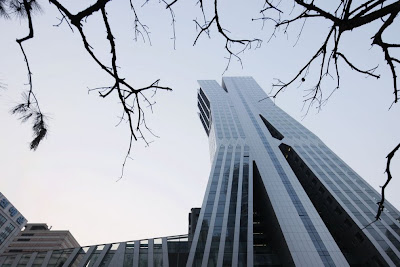The site is located near the Yoido National Assembly, in an area that has been developed since the 1980's and mostly populated with towers built according to this equation to similar height and capacity scales. Generally, the plan of this tower typology is determined by the maximum site coverage (60% in this case), and the maximum F.A.R. (800%), and is repeatedly stacked vertically tower. In this plan, a tower of 14 floors (800% 60% = 13.333) is possible. An urban environment crowded with these types of towers is often monotonous and uninteresting, while the paucity of space between towers results in an oppressive cityscape.
 |
Photography (C) Iwan Baan |
Prototype 1 (Standard): This type is possible when there is enough vertical allowance. The lower four or five levels, mostly filled with high-profit commercial entities, forming a podium of maximum site coverage. Prototype 2 (L-shaped): This is a variation of the podium tower; The tower atop the podium faces the street and horizontally forms an L-shape. The tower?s visibility increases from the street, while increased distance from neighboring buildings to the rear improves the overall environment.
Bundle Matrix
The L-shaped podium tower is reorganized and transforms into three vertical elements: three slimmer towers. The central core tower, the adjoined street-side tower, the adjoined rear tower and the podium form an ?L? The core tower is of reinforced concrete construction, the other two, of steel construction. With the core tower at the center, the slimmer steel construction towers lean at varying angles that still maintain structural soundness. The interstitial spaces extend to the commercial lower four floors with an atrium garden, escalator hall and other common areas for rest and transit that enliven the space. The design may have started from a podium tower prototype, but with the division between the podium and tower vanished, the three slimmer towers and two resultant interstitial gaps create vertical urbanity. According to the 2020 Seoul Urban Basic Project Plan, Yoido will be developed as an international financial district and the center of northeast Asian finance.
High-density highrise projects such as the IFC and Park One are being developed to the site?s northeast as a link to such mid- to long-term plans. This project is at the center of a rapidly-changing Yoido?s commercial and financial center.
Main Sections
The building is comprised of 7 basement levels and 36 superstructure levels, totaling about 39.899 ? and 154.14m in height. Parking and mechanical rooms are located on basement levels 2-7, and community conveniences are on basement levels one to superstructure level four, with the remaining levels 5 to 36 being ?officetels? (live/work space). Levels 14-15, at the core of the building, contain support facilities and central mechanical rooms and mark the division of facilities.
Level 1 Plan: Street Park
A green park space will be installed along the 100m-wide street. The street-side park features bamboo and Japanese spurge landscaping and water fixtures. Mist fountains and lighting will create a distinctive urban park that adds to the site?s role as a gateway.
Perspective: Sky Garden
In the interstitial spaces on either side of the core tower, there are 32 green spaces planned for ?sky parks.? The penthouse level (36th floor) has two outdoor spaces for every three units, with 31 total outdoor spaces that complement the building?s exterior and help formulate the highrises identity.
Type: Residential - Apartment, Commercial - Office, Transport - Parking structure
Location: 26-1 Yeouido-dong, Yeongdeungpo-gu
Seoul
Korea, Republic of
Seoul
Korea, Republic of
Site type: urban
Building area: 39899 m2
A project by: Mass Studies
Architecture
Photo Gallery of S-Trenue: Bundle Matrix in Seoul, Korea
 |
Photography (C) Iwan Baan |
 |
Photography (C) Iwan Baan |
 |
Photography (C) Iwan Baan |
 |
Photography (C) Iwan Baan |
Source: http://www.architizer.com



0 comments:
Post a Comment